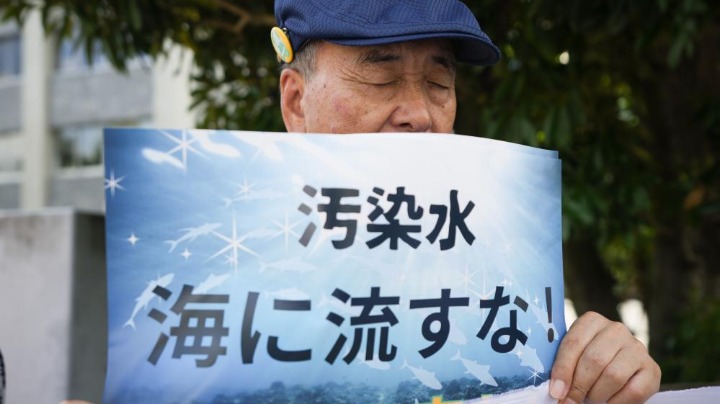Japanese People Rally Against Government’s Plan to Dispose of Nuclear-Contaminated Water
Xinhua News Agency, Tokyo, August 18th – In a show of unity, Japanese citizens have gathered to protest against the government’s plan to dispose of nuclear-contaminated water without authorization. They are demanding that the government adheres to its original promise and explores alternative options such as storing the water on land.
On August 18, protesters gathered in front of the Prime Minister’s residence in Tokyo to express their concerns over the plan to discharge nuclear-contaminated water from Fukushima into the sea. Despite temperatures exceeding 35 degrees Celsius, people from different regions of Japan braved the scorching heat to voice their opposition.
Ryoko Uno, a resident of Kyoto who originally lived in Fukushima City, recounted her worries since learning about the leaked nuclear-contaminated water. She believes it is inappropriate for the government to unilaterally decide to discharge the water into the sea, considering the wide-ranging opposition from local governments and individuals domestically and internationally. Uno hopes that the government will opt for long-term storage of the nuclear-contaminated water on land.
Sato Kazuyoshi, a representative of the non-governmental organization “Don’t pollute the ocean again! Citizens’ Meeting,” highlighted an agreement between the Japanese government, Tokyo Electric Power Company, and the Federation of Fukushima Prefecture Fisheries Cooperation Associations in 2015. The agreement stated that the disposal of nuclear-contaminated water would only occur with the understanding of all relevant parties. Kazuyoshi emphasized the fragile state of the local fishery industry in Fukushima, which has only recovered to around 20% of its pre-nuclear accident levels. Discharging the nuclear-contaminated water into the sea would further threaten the livelihood of fishermen.
The rally participants also submitted a petition to representatives of the Japanese government and Tokyo Electric Power Company at the Members’ Hall of the Japanese Senate. The petition requested that the government and the company adhere to the 2015 agreement, withdraw the plan to discharge the contaminated water, and implement effective measures to prevent the increase of nuclear-contaminated groundwater. The petition also urged reevaluation of alternative treatment options, including long-term storage in large water tanks and mortar curing.
Tomoko Abe, a member of the Japanese House of Representatives and a former pediatrician, emphasized the importance of following principles such as non-proliferation and centralized storage when dealing with radioactive materials. She questioned the morality of discharging nuclear-contaminated water into the ocean, stating, “Why can you throw your own garbage into other people’s yards? That alone is immoral.”
On August 17, non-governmental organizations including Friends of the Earth Japan and the Atomic Energy Information Office submitted over 28,000 public signatures to the Ministry of Economy, Trade, and Industry, urging the government to reconsider the plan. The representatives highlighted the presence of various radioactive substances in addition to tritium within the stored nuclear-contaminated water. They stressed that the total amount of contaminated substances had not been disclosed, causing deep concerns among fisheries practitioners and concerned individuals. Centralized management, land storage, or other alternatives were proposed as more responsible solutions.
The Japanese government had initially set the timeframe for the discharge of the Fukushima nuclear-contaminated water as “this spring and summer.” Speculation has arisen that the discharge may commence at the end of August or early September after Prime Minister Fumio Kishida’s scheduled visits to the United States and China.
[Responsible editor: Dong Jing]
